Unit 7 It's raining单元复习课件(词组+句型+知识点+语法+写作指导+易错考点)
文档属性
| 名称 | Unit 7 It's raining单元复习课件(词组+句型+知识点+语法+写作指导+易错考点) | 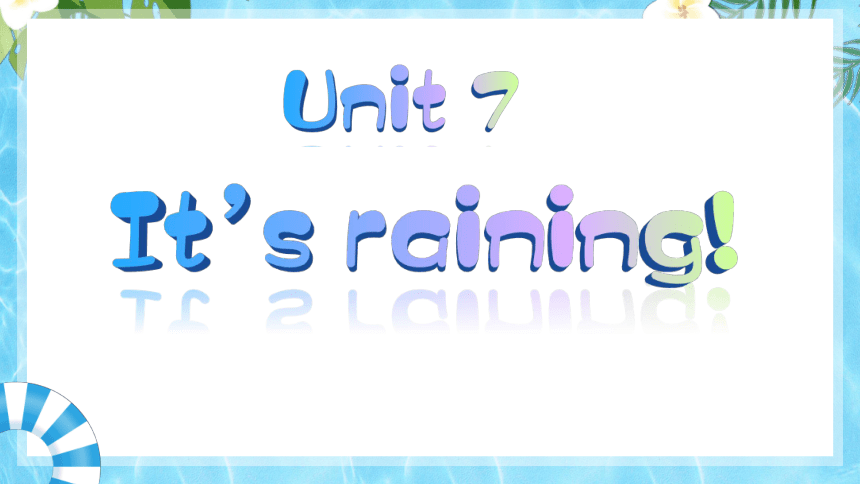 | |
| 格式 | pptx | ||
| 文件大小 | 37.3MB | ||
| 资源类型 | 试卷 | ||
| 版本资源 | 人教新目标(Go for it)版 | ||
| 科目 | 英语 | ||
| 更新时间 | 2024-05-27 15:49:58 | ||
图片预览

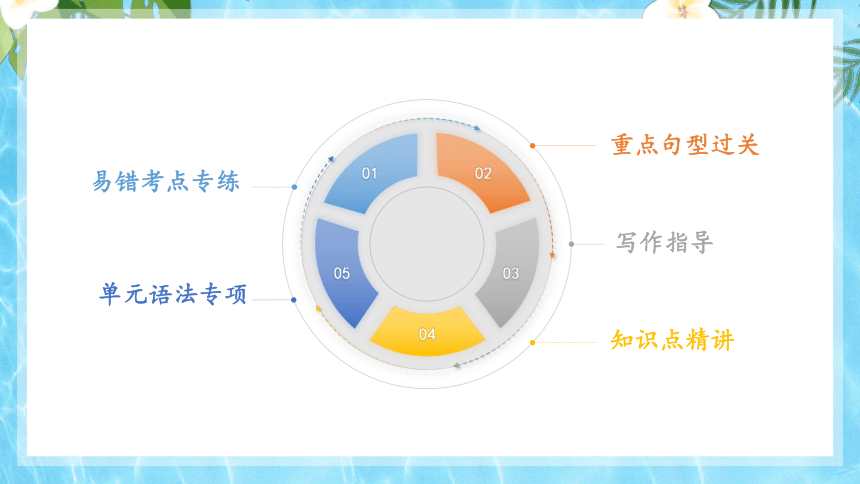

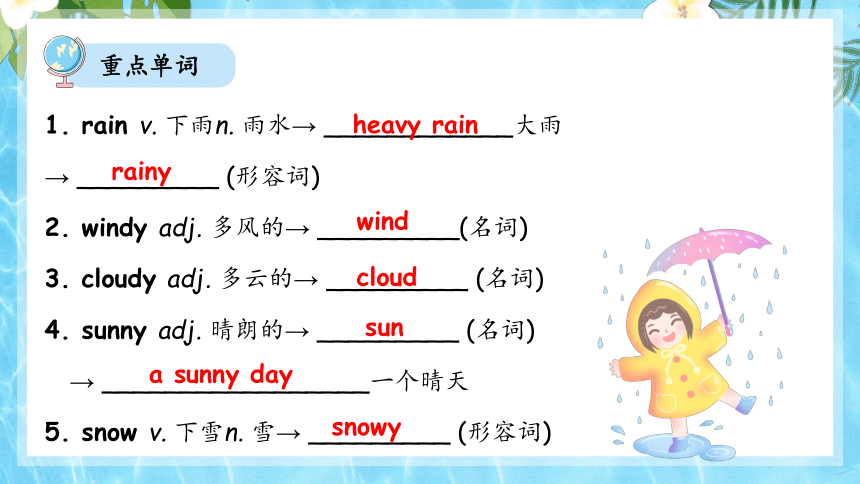
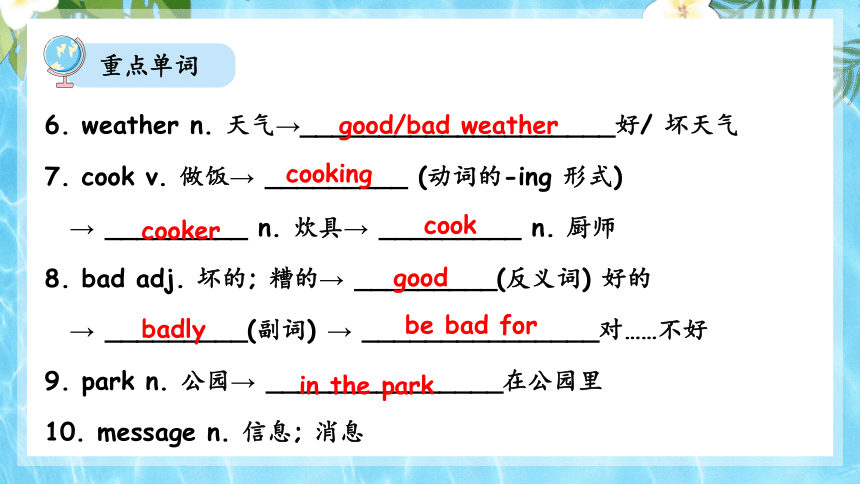
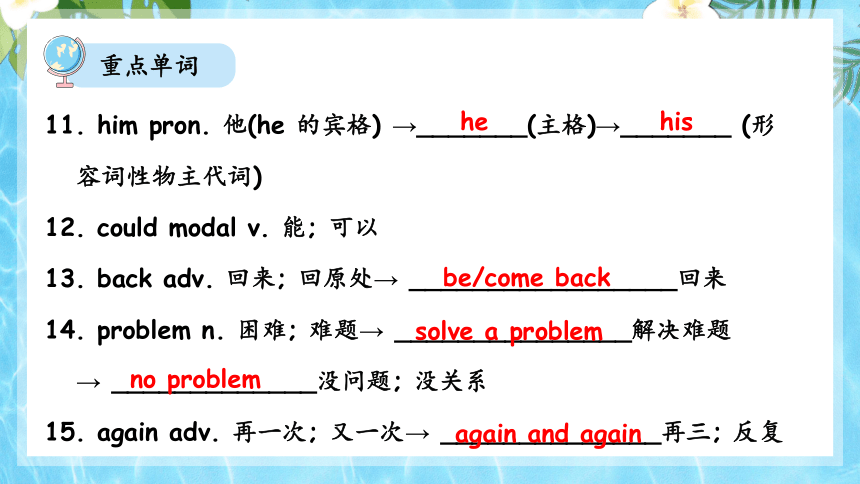
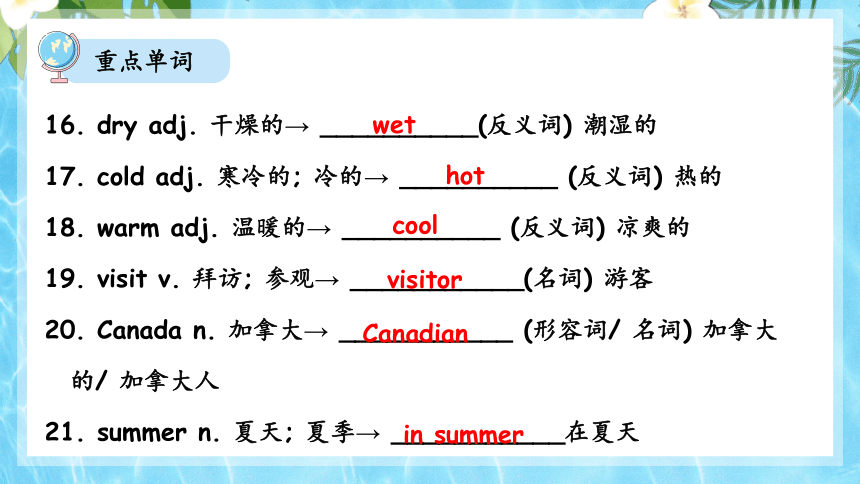
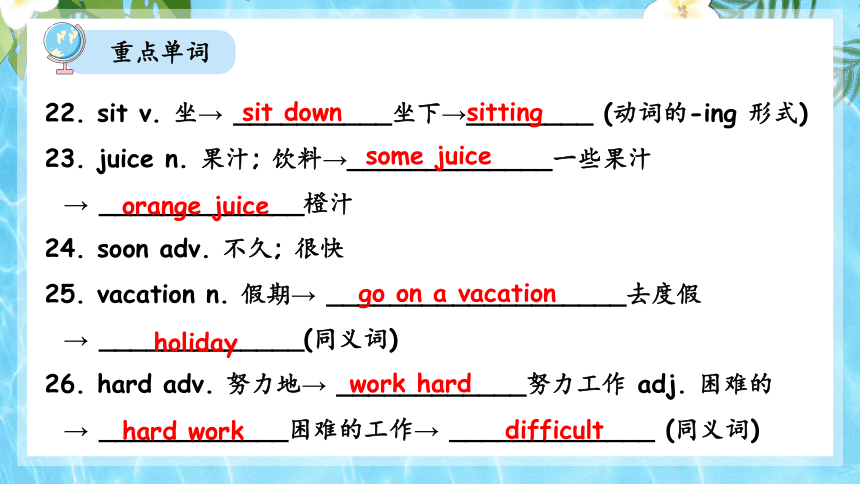
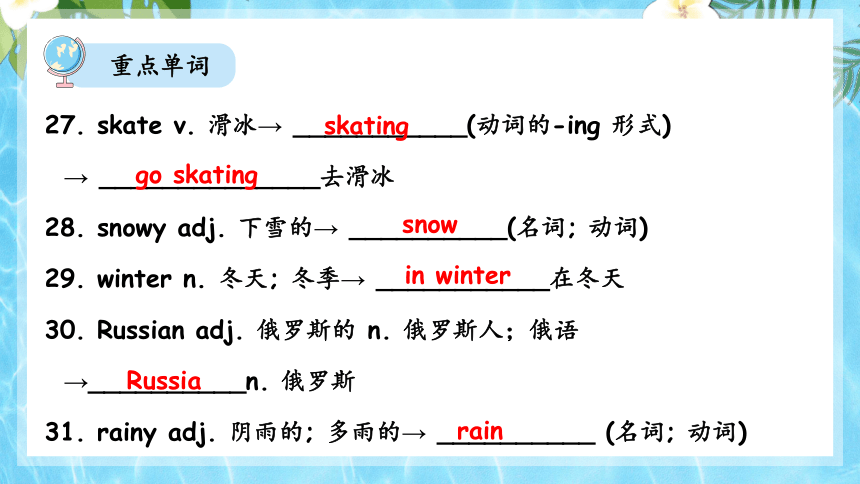

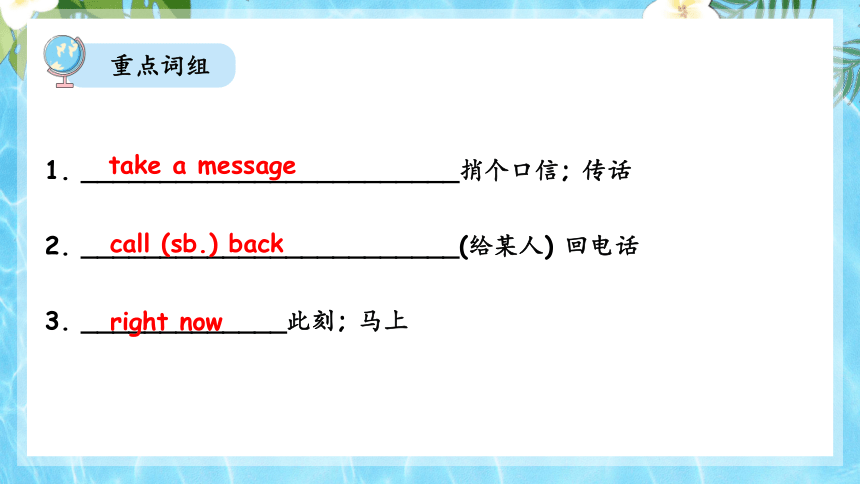
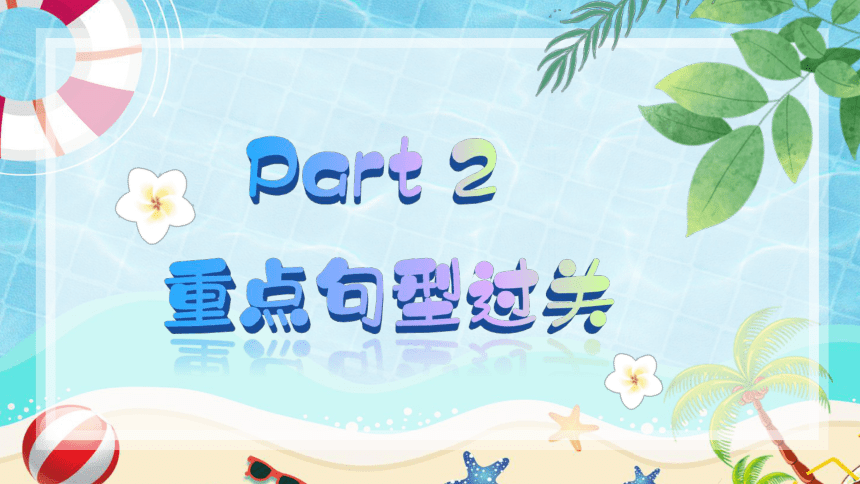
文档简介
(共159张PPT)
重点句型过关
02
写作指导
03
知识点精讲
04
易错考点专练
01
单元语法专项
05
重点单词
1. rain v. 下雨n. 雨水→ ____________大雨
→ _________ (形容词)
2. windy adj. 多风的→ _________(名词)
3. cloudy adj. 多云的→ _________ (名词)
4. sunny adj. 晴朗的→ _________ (名词)
→ _________________一个晴天
5. snow v. 下雪n. 雪→ _________ (形容词)
heavy rain
rainy
wind
cloud
sun
a sunny day
snowy
重点单词
6. weather n. 天气→____________________好/ 坏天气
7. cook v. 做饭→ _________ (动词的-ing 形式)
→ _________ n. 炊具→ _________ n. 厨师
8. bad adj. 坏的; 糟的→ _________(反义词) 好的
→ _________(副词) → _______________对……不好
9. park n. 公园→ _______________在公园里
10. message n. 信息; 消息
good/bad weather
cooking
cooker
cook
good
badly
be bad for
in the park
重点单词
11. him pron. 他(he 的宾格) →_______(主格)→_______ (形容词性物主代词)
12. could modal v. 能; 可以
13. back adv. 回来; 回原处→ _________________回来
14. problem n. 困难; 难题→ _______________解决难题
→ _____________没问题; 没关系
15. again adv. 再一次; 又一次→ ______________再三; 反复
he
his
be/come back
solve a problem
no problem
again and again
重点单词
16. dry adj. 干燥的→ __________(反义词) 潮湿的
17. cold adj. 寒冷的; 冷的→ __________ (反义词) 热的
18. warm adj. 温暖的→ __________ (反义词) 凉爽的
19. visit v. 拜访; 参观→ ___________(名词) 游客
20. Canada n. 加拿大→ ___________ (形容词/ 名词) 加拿大的/ 加拿大人
21. summer n. 夏天; 夏季→ ___________在夏天
wet
hot
cool
visitor
Canadian
in summer
重点单词
22. sit v. 坐→ __________坐下→________ (动词的-ing 形式)
23. juice n. 果汁; 饮料→_____________一些果汁
→ _____________橙汁
24. soon adv. 不久; 很快
25. vacation n. 假期→ ___________________去度假
→ _____________(同义词)
26. hard adv. 努力地→ ____________努力工作 adj. 困难的
→ ____________困难的工作→ _____________ (同义词)
sit down
sitting
some juice
orange juice
go on a vacation
holiday
work hard
hard work
difficult
重点单词
27. skate v. 滑冰→ ___________(动词的-ing 形式)
→ ______________去滑冰
28. snowy adj. 下雪的→ __________(名词; 动词)
29. winter n. 冬天; 冬季→ ___________在冬天
30. Russian adj. 俄罗斯的 n. 俄罗斯人;俄语
→__________n. 俄罗斯
31. rainy adj. 阴雨的; 多雨的→ __________ (名词; 动词)
skating
go skating
snow
in winter
Russia
rain
重点单词
32. Europe n. 欧洲→ _____________ (形容词/ 名词) 欧洲的/ 欧洲人
33. mountain n. 高山→ ___________________在山里
34. country n. 国; 国家→ __________ (复数)
European
in the mountains
countries
重点词组
1. ________________________捎个口信; 传话
2. ________________________(给某人) 回电话
3. _____________此刻; 马上
take a message
call (sb.) back
right now
重点句型
1. —_________ _________ ___________ in Beijing
北京的天气怎么样
—_________ sunny. 天气晴朗。
2. —_________ it going 一切都好吗
—_________ _________, thanks. 还不错,谢谢。
How’s the weather
It’s
How’s
Not bad
重点句型
3. _________ _________ you’re having a good time.
听起来你正玩得很开心。
4. _________ _________ just tell him to call me back
你能告诉他给我回个电话吗
5. —___________________ 天气怎么样
—It’s cloudy./It’s sunny./It’s raining.
天气多云。/ 天气晴朗。/ 天在下雨。
Sounds like
Could you
How’s the weather
重点句型
6. —___________________一切都好吗
—Great!/Not bad./Terrible! 好极了! / 还不错。/ 糟透了!
7. I’m ________ ________ ________ ________ ________ my aunt in Canada.
我正在加拿大看望我的姑姑,过得很愉快。
8. ________ ________ ________ ________ ________ them again. 再次见到他们我是如此高兴。
How’s it going
having a great time visiting
I’m so happy to see
知识点1:rain /re n/ v. 下雨 n. 雨水
考向①:作动词,意为“下雨”,raining 是其动词的-ing 形式。
表示“雨下得大”可用heavily 或hard 修饰rain。
e.g. It is raining heavily/hard in our city.
我们城市雨下得正大。
知识点1:rain /re n/ v. 下雨 n. 雨水
考向②:作名词,意为“雨水”,不可数名词。
e.g. There is much rain here in summer. 这儿夏天雨水很多。
There will be a heavy rain tomorrow.
明天会有一场大雨。
a heavy/light rain 表示“一阵/场大/小雨”。
拓展:
rainy 作形容词,意为“多雨的”。
e.g. It’s a rainy day today.
今天是雨天。
“下雨”的不同形式表达:
① There is rain(n.雨水)in Beijing.
② It is rainy(adj.多雨的)in Beijing.
③ It is raining(v.下雨)in Beijing.
典型例题
—What’s the weather like today
—It’s a _______ day. It’s _______ heavily now.
A. raining; rainy B. rainy; raining
C. rainy; rainy D. raining; raining
典型例题
Tips: For our own safety, we’d better not stand under big
trees on _______ days in summer.
A. sunny B. cloudy C. rainy D. foggy
【点拨】sunny 晴朗的;cloudy 多云的;rainy多雨的;foggy 有雾的。根据句意和常识可知,夏天下雨天最好不要站在大树下。
知识点2:How’s the weather 天气怎么样?
考向:How’s the weather 天气怎么样?
是用来询问天气状况的常用句型,
同义句:“What’s the weather like ”。询问某地的天气状况时, 在句子末尾加介词短语“in +某地”。
答语:用“It’s + 描述天气的形容词.”或直接用描述天气的形容词,
也可以用现在进行时“It’s raining/snowing.正在下雨/ 下雪。” 进行回答。
知识点2:How’s the weather 天气怎么样?
e. g. —How’s the weather in Beijing
=What’s the weather like in Beijing
北京的天气怎么样
—It’s raining. /It’s rainy. /Rainy.
正在下雨。/ 是雨天。/ 雨天。
此处it 在句中作主语,
指“天气”。
拓展:
询问天气的时候, 也可用句型: “What do
you think of the weather (in…) ”,
回答时可用Good/Not bad/Terrible. 等。
典型例题
—________
—It’s windy.
A. What fine weather B. What’s the weather
C. How is the weather D. How are you
常见的形容天气的形容词有:
fine 晴朗的 dry 干燥的 warm 温暖的
cold 寒冷的 cool 凉爽的 hot 炎热的
rainy 阴雨的 snowy 下雪的 sunny 晴朗的
cloudy 多云的
含有“weather”的短语:
weather report 天气预报
fine weather 晴天
cloudy weather 阴天
知识点3:weather /'we (r)/ n. 天气
考向:weather 用作不可数名词,不能用a/an修饰,其前常加定冠词the,谓语动词用单数。
e.g. When cold weather comes, many birds move to warmer places to find food.
当寒冷的天气到来时,许多鸟类会搬到更温暖的地方寻找食物。
What bad weather! 多么糟糕的天气啊!
The weather here looks terrible today.
今天这儿的天气看起来很糟糕。
典型例题
—How is the ________ today
—It’s hot. You don’t need to wear the coat.
A. weather B. traffic C. price
【点拨】用词义辨析法。weather“天气”;traffic“交通”;price“价格”。由答语“天气很热。你不需要穿那件外套。”可知,此处询问天气。
知识点4:cloudy /'kla di/ adj. 多云的
考向:cloudy 是由名词cloud(云)加后缀-y 构成的形容词。
e.g. There are black clouds in the sky. Today is cloudy.
天空中乌云密布。今天多云。
拓展:“名词+-y (后缀) 构成描述天气的形容词,
rain—rainy 阴雨的;snow—snowy 下雪的; wind—windy 多风的;fog—foggy 多雾的; sun—sunny 晴朗的; ice—icy 冰冷的。
典型例题
今天多云,天气凉爽。
It’s __________ and cool today.
cloudy
知识点5:cook /k k/ v. 做饭
用法 示例
不及物动词“做饭” My mother taught me how to cook.
妈妈教我怎样做饭。
及物动词,“烹调,煮,烧”cook sb. sth. =cook sth. for sb. 给某人做饭 Today I want to cook my parents fish.
=Today I want to cook fish for my parents.
今天我想给父母烧鱼。
知识点5:cook /k k/ v. 做饭
拓展:cook n. 厨师; cooker n. 炊具
e. g. The cook is cooking with the cooker now.
厨师现在正在用炊具做饭。
易错点:cooking 既是动词的-ing 形式,也可作不可数名词,意为“烹饪;做饭”。do some cooking 烹饪;做饭
典型例题
Tom would like to c a meal for his mother on her
birthday.
【点拨】由“a meal”及首字母可知,汤姆为妈妈做饭。
cook 意为“做饭”;would like to do sth. 意为“想要做某事”,为固定搭配。
ook
知识点6:How’s it going 最近怎么样?
考向:How’s it going 最近怎么样?
是询问对方的处境或事情进展如何的习惯用语, 后面可跟介词短语“with sb./sth.”, 可与“How’s everything / How’s everything going ”等互换。
e.g. —How’s it going with Mary/Mary’s study
玛丽/ 玛丽的学习情况最近怎么样?
—Pretty good! 相当好!
“最近怎么样”的常用答语:
Not bad. 还不错。 Pretty good! 相当好!
Wonderful! 好极了! Terrible! 糟糕透了!
Everything is going well.
一切进展顺利。
典型例题
—It’s a long time since we met last year, Alice. How’s it going
—_______. Many thanks.
A. Pretty good B. The same to you
C. It doesn’t matter D. Help yourself
【点拨】How’s it going 意为“你最近还好吗?”。是熟人见面时的寒暄语。可以回答:Pretty good非常好;Great 很棒;Terrible 很不好。
知识点7:Not bad. 还不错。
考向:也可用作“Not so bad./Not too bad.”等,常用于对自己处境或事情进展等情况询问的回答。
e.g. —How are you today 你今天怎么样?
—Not bad, thanks. 还不错, 谢谢。
可用"Not bad." 进行回答的问句:How are you 你好吗?
How's it going 近来如何?
典型例题
—How is your Chinese going
—_____. I can read pretty well and my writing has improved.
A. Not bad B. Not yet
C. No way D. Not at all
知识点8:bad/b d/ adj. 坏的; 糟的
e. g. The apple is bad. 苹果坏了。
Every time I see these beautiful kites, my bad feelings go away.
每次我看到这些漂亮的风筝,我不好的情绪就消失了。
表语
定语
知识点8:bad/b d/ adj. 坏的; 糟的
拓展:bad 作形容词,还可意为“有害的”,
be bad for 对……有害,反义短语为 be good for 对……有好处。
e.g. Smoking is bad for you. 抽烟对你有害。
bad 的相关词:good adj. 好的(反义词)
badly adv. 严重地
知识点9:sound like 听起来像……
考向:交际用语。本句是一个省略句,完整的句子是“It sounds like you’re having a good time.”。sound like 意为“听起来像……”,后跟名词、代词或句子。。
e. g. It sounds like a good idea. 听起来像一个好主意。
It sounds like you are having a good time on your trip.
听起来你旅行正玩得很愉快。
+名词短语
+句子
知识点9:sound like 听起来像……
拓展:sound 作动词,意为“听起来”,后可接形容词、名词、代词或介词短语。
e.g. That sounds great. 那听起来很好。
Your dream sounds a good one. 你的梦想听起来很好。
It sounds like a great song. 它听起来像一首很棒的歌。
英语中的感官动词
look, smell, taste, feel 等,后面都可以加介词like,再接宾语。
典型例题
—Would you like to play basketball with us tomorrow
—_____, but these days I’m too busy with the singing
competition.
A. I’ll take your suggestion B. I’m sorry to hear that
C. That sounds like fun D. With pleasure
【点拨】A 项“我将接受你的建议”;B 项“听到那我很难过”;C 项“那听起来很有趣”;D 项“愿意效劳”。由答语后面“但这些天我太忙于歌唱比赛”可推知想去打篮球,却去不了,故C 项符合语境。
知识点10:have a good time 玩得开心;过得愉快
考向:也可表示为“have a great/nice/wonderful time”。“Have a good time!”还可作为对对方的一种祝愿。表示“做某事开心”时要说“have a good time doing sth.”。
e.g. Everyone is having a good time at the party.
每个人在聚会上都正玩得开心。
知识点10:have a good time 玩得开心;过得愉快
—We will go on a trip to Qinhuangdao.
我们将要去秦皇岛旅行。
—Have a good time!(祝你们)玩得开心!
We have a good time taking a high-speed train.
= We have fun / enjoy ourselves taking a high-speed train.
我们乘高铁很开心。
(做某事)玩得开心”的不同表达
have a good/great/wonderful time(doing sth.)
have fun(doing sth.)
enjoy oneself(doing sth.)
典型例题
如果你尝试冰雪运动,你会玩得很开心。
If you try ice and snow sports, you will __________ _________
________________ _________.
have a
good/great time
知识点11:message/mes d / n. 信息; 消息
e. g. Please take a message for Mike.
请给迈克捎个口信。
Maybe I can send a message to you before I arrive.
也许我可以在我到达之前给你发个信息。
You can leave a message for Jack.
你可以给杰克留个口信儿。
知识点11:message/mes d / n. 信息; 消息
message的相关短语有:
① take a message for sb. =give sb. a message =give a message to sb.给某人捎口信
② send a text message to sb. = send a message to sb.
给某人发短信
③ leave a message 留言
辨析: message, news 与information
message “消息;信息”, 可数名词 常指口头或书面告知的消息。
news “新闻;消息”, 不可数名词 指发生不久的消息,特别是报纸、广播、电视中发布的消息,强调“新”。
information “信息;消息”, 不可数名词 指通过各种途径得到的信息资料,强调内容,不强调“新”。
一语辨异:
Look at the news! It’s about a story of a strange message. You can ask Jack for more information.
看这条新闻!这是一个关于一个奇怪的消息的故事。你可以向杰克询问更多的信息。
典型例题
—Hello! Can I speak to Jenny, please
—Sorry, she isn’t in. Can I ________ a message
A. take B. read
C. check D. receive
【点拨】take 拿,带;read 读;check 检查;receive 收到。根据“Sorry, she isn’t in.”可知,珍妮不在家,所以问对方是否需要带话,take a message“带话,捎信”。
知识点12:Could you... 你能……吗?
考向:用于委婉地提出请求。
①could 为情态动词, 比can 更委婉、客气。
②肯定回答可用:Sure./Of course./Certainly. “当然可以。”;
With pleasure.“很乐意。”;No problem. “没问题。”。
③否定回答常用Sorry, I can’t. I... “抱歉, 我不能。我……”。
知识点12:Could you... 你能……吗?
e. g. —Could you go to the movies with me
你可以和我一起去看电影吗
—Sure. 当然。(肯定回答)
—Sorry, I can’t. I have to do my homework. (否定回答)
对不起, 我不能。我得做我的家庭作业。
易错点: 对于 “Could you... ”表请求的回答要用can/can’t,而不能用could/couldn’t。
拓展:Could I... 意为“我能……吗?”,是请求对方允许自己做某事的句型。
(1) 肯定回答可说:Yes./Sure./Certainly. 当然可以。
Of course, you may. 当然可以。
Yes, do please. 是的,请吧。
(2) 否定回答可说:No, please don’t. 不,请不要。
I’m sorry you can’t. 对不起,你不可以。
I’m sorry, but... 对不起,但是……
典型例题
My car is broken. ____ you please give me a lift
A. Must B. Need C. Should D. Could
【点拨】由上句“我的车坏了。”可知,此处是请求帮助。句型“Could you please do sth. ”意为“你能做某事吗?”。
知识点13:call me back 给我回电话
e.g. Please tell your mother I will call her back this afternoon.
请告诉你妈妈,我今天下午将给她回电话。
考向:call sb. back 意为“给某人回电话”。call back 是“动词+ 副词”的结构, 代词作宾语时, 要放在动词和副词之间。
知识点14:back /b k/ adv. 回来;回原处
考向:back 作副词,常与动词一起构成动词短语。
e.g. They’ll come back next week.
他们将在下周回来。
Please take your scarf back.
请把你的围巾拿回去。
back 常用短语:
① call back 回电话 ② come back 回来
③ get back 返回 ④ go back 回去
⑤ pay back 偿还 ⑥ bring back 带回
知识点14:back /b k/ adv. 回来;回原处
拓展:back 的其他用法:
back adj. 后面的
e.g. There are some photos on the back blackboard.
在后面的黑板上有一些照片。
n. 背部;后部
e.g. The little monkey is on its father’s back.
小猴子在它父亲的背上。
知识点15:no problem 没问题
e.g. —Could you help me clean the room 你能帮我打扫房间吗?
—Sure, no problem. 当然,没问题。
考向:No problem. 为交际用语。用来表示同意或愉快地回答请求,意为“当然,没问题/小事一桩”。其中problem 用作可数名词,意为“困难;难题”。
拓展: “No problem. ”的常见用法:
No problem. 用于礼貌地回答某人的感谢, 意为“不用谢/别客气”。 —Thank you very much.
非常感谢你。
—No problem. 不客气。
用来回答道歉, 意为“没关系/ 没什么”。 —I’m sorry I can’t go with you. 很抱歉我不能和你一起去。
—No problem. 没关系。
拓展: “No problem. ”的常见用法:
No problem. 用来表示有能力做某事, 意为“没问题/不在话下”。 —Can you finish the work in an hour
你能在一小时内完成这项工作吗
—No problem. 没问题。
用来表示安慰, 意为“那没关系/ 那不成问题”。 —I left my money at home.
我把钱忘在家里了。
—No problem. I can lend you some.
那不成问题, 我可以借给你一些。
知识点16:problem /'pr bl m/ n. 困难;难题
辨析:problem 与question
problem 指说话者认为难以解决的问题或数学、物理中的习题。
question 指说话者需要寻找答案的问题。
一语辨异:
The math problem is difficult. He can't answer the question.
这道数学题很难。他回答不了这个问题。
典型例题
Thanks to the teacher’s help, I solved all the _______ easily.
A. chances B. problems
C. habits D. grades
知识点17:right now 此刻;马上
同义短语:right away=in a minute=at once/immediately
=at the moment,可用于现在进行时的句子中。
e.g. To learn more, use the app right now.
想了解更多,马上使用该应用程序。
Mum is cooking right now. 妈妈此刻正在做饭。
典型例题
Don’t worry! He’s going to meet you ______.
A. just now B. yesterday
C. right now D. at times
【点拨】just now 刚才;yesterday 昨天;right now 立刻;马上;at times 有时。由前句“不要担心”可知本句意为“他马上去见你”。right now 符合语境。
知识点18:again/ ɡen/, / ɡe n/ adv. 再一次; 又一次
e.g. The story is so interesting that he reads it again and again.
这个故事如此有趣以至于他读了再读。
My brother went to the Great Wall once again.
我哥哥再一次去了长城。
It rains now and again in summer.
夏天不时地下雨。
有关again 的短语:
① again and again
再三;一再;反复;三番五次
② once again 再一次
③ now and again 时而, 不时
知识点19:dry 干燥的
考向:dry 用作形容词,意为“干燥的”,常用作表语或定语。
e.g. The weather is hot and dry. 天气炎热且干燥。
That’s a dry place. 那是一个干燥的地方。
联想串记:
dry 反义词 wet (潮湿的)
dry 形近词 cry(哭)形近词 try(尝试)
知识点19:dry 干燥的
拓展:dry 还可以作动词,具体用法有:
用法 示例
及物动词,意为“使干燥;弄干”。 Don’t cry! Dry your eyes.
别哭了!擦干你的眼睛。
不及物动词,意为 “变干”。 The wet clothes will soon dry in the sun.
湿衣服在阳光下很快就会干。
典型例题
It’s _______ here. People hope it can rain soon.
A. wet B. dry
C. cold D. warm
知识点20:cold /k ld/ adj. 寒冷的;冷的
考向:cold 用作形容词,既可以用来形容天气,又可以用来形容人的特征或感觉。
e.g. It’s a cold morning. 这是一个寒冷的早晨。
A cold hand and a warm heart.
刀子嘴,豆腐心。
辨析:cold 与 cool
cold 形容词,意为“冷的”, 反义词为hot。 It’s a cold winter.
这是一个寒冷的冬天。
cool 形容词,意为“ 凉爽的”,反义词为warm。 还可意为“酷的”。 It’s very cool today.
今天天气很凉爽。
I like Liu Chao. He is very cool.
我喜欢刘超。他很酷。
知识点20:cold /k ld/ adj. 寒冷的;冷的
拓展:cold 还可作名词,意为“伤风;感冒”。
e.g. She is in bed with a cold. 她因感冒而卧床。
联想记忆:
cold(冷的) old(老的;旧的)
cold(冷的) hot(热的;炎热的)
形近词
反义词
典型例题
It’s so c in winter in Harbin that most people stay in
warm houses.
【点拨】根据首字母提示和句意可知,此处是指哈尔滨冬天很冷。
old
知识点21:visit /'v z t/ v. 拜访;参观
考向:visit 作动词时,常见用法:
① visit sb.拜访某人 ② visit+ 地点名词参观某地
e.g. I visit my grandfather on weekends.
我在周末看望我爷爷。
I am happy to visit the Disneyland.
我很高兴参观迪士尼乐园。
拓展:(1) visit 用作名词,意为“访问;参观;拜访;游览”。pay a visit to...“参观……”;be on a visit to...“参观……”。
e.g. Jack pays a visit to China this year. And this is his first
visit to China. 杰克今年来中国旅游了。这是他第一次游览中国。
I hope that we’ll be on a visit to the first forest library in
Shanghai. 我希望我们能参观一下上海的第一个森林图书馆。
(2) visitor n. 参观者;游客
e.g. There are many visitors in Beijing every year.
每年北京有许多游客。
典型例题
Lucy often v (看望)her grandparents in her spare
time.
【点拨】表示“看望某人”要用动词visit;句中often及in her spare time 表明句子用一般现在时;主语Lucy 是第三人称单数,故谓语动词用第三人称单数形式。
isits
知识点22:Canada/k n d / n. 加拿大
考向:Canadian 用作形容词, 意为“加拿大的”; 用作名词, 意为“加拿大人”,复数是Canadians。
e.g. She is a Canadian girl. 她是个加拿大女孩。
They are Canadians. 他们是加拿大人。
My cousin studies in Canada.
我的表哥在加拿大求学。
一语辨异:
The two boys are from Canada. They are Canadians. The Canadian boys like China very much.
这两个男孩来自加拿大,他们是加拿大人。这两个加拿大男孩非常喜欢中国。
知识点23:be happy to do sth. 很高兴做某事
e.g. He is happy to pass the exam. 他通过考试很开心。
My teacher is happy about the result.
我的老师对结果很满意。
He is happy that he can see his favourite singer.
他很高兴能看到他最喜欢的歌手。
be happy about sth.
对某事/物感到满意
be happy+that 从句
很高兴……
知识点24:by /ba / prep. 在……旁边
e.g. Come and sit by /beside me. 过来挨着我坐。
I live near the park. 我住在公园附近。
The shop is beside the river.
那家商店在河旁边。
The hotel is next to the zoo.
旅馆就在动物园隔壁。
知识点24:by /ba / prep. 在……旁边
辨析:by, near, beside与next to
by (可与beside互换) 在……旁边
near 在……附近,与目标物有一定距离
beside 在……旁边
next to 紧邻
拓展:by 的其他用法
用法 示例
by + 交通工具,意为 “乘坐……”。 Uncle Wang goes to work by car.
王叔叔开车去上班。
表示“用某种方法或 手段”。 The young man makes a living by delivering.
这个年轻人通过送外卖谋生。
表示移动方向,意为 “经过”。 He walked by me without speaking.
他从我身边走过, 没说一句话。
表示时间,意为“在……之前;不迟于”。 Can you finish the work by next Monday
你能在下星期一前完成工作吗?
知识点24:by /ba / prep. 在……旁边
e.g. She can handle this by herself.
这点事她一个人能应付。
By the way, do you like the art show
顺便问一下,你喜欢这个艺术展吗?
含 by 的短语:① by oneself 单独,独自
② by the way 顺便问一下
典型例题
On sunny days, my grandma often reads a novel ________ the
window.
A. by B. for
C. with D. from
知识点25:See you soon. 再见。
类似表达“再见”的还有:See you. See you later.
See you next time.
e.g. —Let’s meet in the sports club tomorrow.
让我们明天体育俱乐部见吧!
—See you soon. 再见。
知识点26:hard /hɑ (r)d/ adv. 努力地 adj. 困难的
hard 的具体用法:
副词, 修饰动词 意为“努力地” Work hard, or you won’t get good grades. 努力学习,否则你就不会取得好成绩。
意为“大量地”,相当于heavily It’s raining hard outside.
外面雨下得很大。
知识点26:hard /hɑ (r)d/ adv. 努力地 adj. 困难的
hard 的具体用法:
形容词,作定语或表语 意为“困难的”,相当于difficult They lived a hard life.
他们过着艰难的生活。
意为“坚硬的” The stone is too hard.
这块石头太硬了。
典型例题
努力地工作是重要的,但我们也必须有时间放松。(work)
It is important to _________ __________, but we must also
have time to relax.
work hard
知识点27:on a vacation 在度假
考向:on a vacation 相当于on vacation, 介词on 用来说明活动或
状态。
e.g. They’re on(a) vacation in Paris.
他们正在巴黎度假。
知识点27:on a vacation 在度假
vacation 的相关搭配:
① go on/for vacation 去度假, 表示动作
② take/have a vacation 休假
③ be on vacation 在度假”, 表示状态
④ summer vacation 暑假
⑤ winter vacation 寒假
知识点27:on a vacation 在度假
辨析:vacation 与holiday
vacation 主要用于美式英语,既可表示长时间的假期,也可指一两天的短时间的假日,在英式英语中则主要指“大学的假期”。
holiday 单数形式可指一两天的短期假日; 较长期的假期常用复数形式,但也可用单数形式。
典型例题
—Hi, Zhang Jie. Long time no see.
—Hi, Wang Wei. I was on ______ in the countryside and helped
Grandpa on the farm.
A. time B. vacation C. business D. information
【点拨】用题眼法。由关键信息helped Grandpa on the farm 可知,“我”在乡下度假。
知识点28:work /w k/ v. 运转
考向:work 用来表示仪器、设备的“运作;运行”,这种情形下,若用于否定结构, 大多表示某一物件“坏掉了”或“不运作了”。
e.g. The clock isn’t working now.
现在钟坏了。
知识点28:work /w k/ v. 运转
拓展:work 也可指效果和作用,作动词使用,
Sth. isn’t working./Sth. doesn’t work.
=There is something wrong with.../Sth. Is broken.
短语:work well,意为“效果不错,作用良好”。
e.g. He says this way works well.
他说这个方法很管用。
典型例题
—Why do you walk to school today
—Because my bike doesn’t _______.
A. walk B. go
C. work D. run
知识点29:write to sb. 给某人写信
考向:write to sb.= write a letter to sb.给某人写信
e.g. The boy wants to write to his favorite writer.
=The boy wants to write a letter to his favorite writer.
这个男孩儿想给最喜欢的作家写封信。
I often hear from my pen pal.
=I often receive/get a letter from my pen pal.
我经常收到我笔友的来信。
收到某人的来信:
hear from sb.
=receive/get a letter from sb.
知识点29:write to sb. 给某人写信
拓展:write back to sb. 给某人回信
e.g. I must write back to my parents now.
我现在必须给我父母回信。
知识点30:反意疑问句
考向:反意疑问句“前肯后否,前否后肯”
表示提出看法,问对方同意与否。反意疑问句一般由两部分组成:“陈述句+简略问句?”。反意疑问句的前后两部分在人称、时态和数上都要保持一致。
反意疑问句的基本结构:
① 肯定陈述句+ 否定简略问句?
② 否定陈述句+ 肯定简略问句?
知识点30:反意疑问句
e.g. The students are having math, aren’t they
学生们在上数学课,是吗?(前肯后否)
Mike doesn’t go to school today, does he
迈克今天不去上学,是吗?(前否后肯)
知识点30:反意疑问句
拓展:
(1) 对反意疑问句的回答要根据实际情况而定。事实为肯定的就用Yes 回答, 事实为否定的就用No 回答。Yes 后面一定跟肯定句, No 后面一定跟否定句。“前否后肯”时,Yes 意为“不”,No 意为“是”。
e.g. —Bill doesn’t want to go shopping, does he
比尔不想去购物,是吧?
—Yes, he does./No, he doesn’t. 不,他想。/ 是的,他不想。
知识点30:反意疑问句
拓展:
(2) 当陈述部分中有否定意义的单词,如no、never、little、few、hardly 等时,反意疑问部分用肯定形式。
e.g. Alice has no sisters, does she
艾丽斯没有姐妹,是吗?
反意疑问句用法歌诀:
反意疑问真好变,前后肯否须相反。
有情要用情加主,有be 要用be 加主。
若是无情又无be,要用do 主来代替。
Let’s go 特殊记,shall we 提前要牢记。
典型例题
—It’s Father’s Day, ________
—Yes. Let’s buy a gift for Dad. He works very hard for us.
A. isn’t it B. doesn’t it C. isn’t he D. doesn’t he
【点拨】用语法分析法。反意疑问句遵循“前肯后否,前否
后肯”原则。陈述部分是It’s...,因此疑问部分要用isn’t it。
知识点31:take a photo 拍照
考向:take a photo/photos of sb./sth. 意为“给某人/某物拍照”。
e.g. Li Ming is taking a photo. 李明正在自拍。
It’s easy to take photos today. 今天要拍照很容易。
Do you like taking photos of animals
你喜欢给动物拍照吗?
知识点31:take a photo 拍照
拓展: 名词photo 变为复数形式时要加-s, 而不是-es。以-o 结尾的
名词变复数时加-es 的有:
tomato → tomatoes(西红柿)
potato → potatoes(土豆;马铃薯)
hero → heroes(英雄)
take 构成的短语:
① take a walk 散步
② take a bus 乘公共汽车
③ take some exercise 做些运动
④ take a vacation 度假
典型例题
看!孩子们正在拍一张月亮的照片。
Look! The children are ____________ ______ __________ of
the moon.
taking a photo
现在进行时(二)
现在进行时的特殊疑问句① 疑问词 + be + 动词的-ing 形式 + 其他
(对主语提问)
疑问词 + be + 主语+ 动词的-ing 形式 + 其他(对非主语提问)
不能用于现在进行时的情况 表示感官的动词:hear, see, taste, sound, notice, smell 等。②
表示占有、从属、构成等关系的动词:have, own, contain(包含), possess(拥有)等。③
表示认为、理解等的动词:understand, believe, know, recognize, remember, forget, think 等。④
表示存在的状况:be, remain 等。⑤
表示感情、希望的动词: like, love, hate, prefer, want, wish 等。⑥
注意 当have 表示“开会;吃饭;玩得高兴”等意思时可以用于现在进行时。⑦
考点1:现在进行时的特殊疑问句
e.g. Jack is waiting for the bus. (对主语提问)
杰克正在等公共汽车。
→ Who is waiting for the bus
谁正在等公共汽车?
They are listening to music.(对非主语提问)
他们正在听音乐。
→ What are they doing
他们正在做什么?
典型例题
My parents are waiting for me at home.(对画线部分提问)
__________ __________ your parents waiting for you
【点拨】由题干可知此处是对地点“at home”提问,故疑问词用Where,句子为现在进行时态,be 动词为are。
Where are
考点2:不能用于现在进行时的情况
1.表示感官的动词:hear, see, taste, sound, notice, smell 等。
e.g. The food smells good.
这个食物闻起来不错。
2.表示占有、从属、构成等关系的动词:have, own, contain(包含), possess(拥有)等。
e.g. I have two brothers and a sister.
我有两个哥哥和一个姐姐。
考点2:不能用于现在进行时的情况
3.表示认为、理解等的动词:understand, believe, know,
recognize, remember, forget, think 等。
e.g. I know what he is doing.
我知道他正在做什么。
I forget what he said.
我忘记他说什么了。
考点2:不能用于现在进行时的情况
4.表示存在的状况:be, remain 等。
e.g. Tom is a good student.
汤姆是个好学生。
5.表示感情、希望的动词: like, love, hate, prefer, want, wish 等。
e.g. I want a schoolbag and a pencil box.
我想要一个书包和一个铅笔盒。
易错点:
当have 表示“开会;吃饭;玩得高兴”等意思时可以用于现在进行时。
e.g. They are having a good time.
他们正玩得高兴。
假如你叫Mary, 现在给你的笔友Nancy 写信, 介绍你的家庭成员及其活动, 还有天气情况。提供材料如下:
要求: 语法正确, 语句通顺, 不少于80 词。
单元话题
季节 气候
夏天 很热,多雨
冬天 多风且很冷
家庭成员 职业 活动
爸爸 记者 正在看电视
妈妈 老师 正在洗衣服
姐姐 护士 正在和朋友打电话
1. 描述天气和人们的活动时要按照先天气后活动的顺序来写, 并把天气与人们的活动结合起来。要准确使用描述天气的形容词及句型。
2. 描写人们的活动时要用现在进行时,并把人们的感受也写一写。
审题指导
写作方法
第一步:问候及引出话题;
第二步:分别谈论天气和人物活动;
第三步:结尾与落款
三步法“写信谈
天气及人物活动
写作模板
『三步法』 写信 谈天气 及 人物活动 引出话题 Dear Nancy,
How is it going Now let me tell you...
具体 描述 天气 情况 The weather…; lt's...in summer. In winter,…
人物 活动 My father is...; My mother is …; My sister is...
结尾 与落款 Please write to me soon...
Yours,
Mary
经典词句
单词 weather, reporter, hot, rain, summer, winter, cold, warm, cool, wet, dry, snow, windy, cloudy, sunny,
短语 tell sb. sth., a TV station, talk on the phone, stay at home, have a great time, take a vacation
经典词句
句子 ① How is it going
② Now let me tell you something about my family and the weather in my city.
③ My sister is talking on the phone with her friend.
④ The weather in my city isn’t good.
⑤ I want to go there again next time.
Dear Nancy,
How is it going Now let me tell you something about my family and the weather in my city.
The weather in my city isn’t good. It’s very hot and it often rains in summer. ① In winter, we often stay at home because it’s windy and quite cold. ② Right now, it’s too cold to go outside, so we stay at home. ③
范文赏析
My father is a reporter and he works at a TV station. Now he is watching TV. My mother is a teacher. She teaches music. She is washing clothes. My sister is a nurse and she is talking on the phone with her friend.①
Please write to me soon and tell me something about your family and the weather in your city.
Yours,
Mary
范文赏析
本文用“三步法”写信谈天气及人物活动。
第一步——问候及引出话题。
第二步——分别谈论天气和人物活动。
第三步—— 结尾与落款。层次清晰,语言流畅。
名师点评
①并列连词and 连接两个并列的句子,使句子有感染力。
② 本句使用了原因状语从句,使文章表现形式丰富多样。
③ 此处使用了“too...to...”的结构,句子看似简单,实则包含丰富的含义;so 连接的句子表结果,和前面的原因状语从句相呼应, 避免了句式的单一。
名师点评
假如你是李华,请给你的美国朋友Lucy用英语写一张明信片,给她介绍你和你的家人在海南度假的情况及此刻你们正在做的事。
提示: 1.天气晴朗,有点炎热。
2.我和家人去海滩游玩。
写作实践
思路点拨
介绍度假地点
介绍正在做的事
in Hainan, summer, hot, sunny,
many places, visit
I, walk, by the sea, my little brother,
play with sand, my father, swim,
my mother, take photos
Dear Lucy,
How’s it going? Now I’m on a vacation in Hainan and I am having a good time here. It’s summer now. The weather is sunny and a little hot. Many places here are very beautiful, and my family and I are visiting them these days. It’s afternoon right now. I am walking by the sea. My father is swimming in the sea.
范文赏析
My little brother is playing with sand happily. My mother is taking photos of him. It’s relaxing, isn’t it?
See you soon.
Yours ,
Li Hua
范文赏析
李梅在加拿大上学,今天收到妈妈发来的电子邮件,询问她当地的天气和她的生活情况。假如你是李梅,请根据下列提示回复妈妈的邮件。
要求: 60词左右。
内容提示: 1.加拿大现在是冬季,多风而且寒冷,人们都穿着暖和的衣服。2.朋友们在公园里做游戏,一些老人在锻炼,一些男孩子在踢足球。
写作实践
Dear Mom,
How’s it going? Now let me tell you something about the weather and my life in Canada.
Well, I’m having a good time here. Now it’s winter in Canada. The weather is windy and cold. People are all wearing their warm clothes.
范文赏析
Right now my friends are playing games in the park. Some old people are exercising. Some boys are playing soccer.
I feel relaxed here.But I miss you and Dad.
Yours,
Li Mei
范文赏析
易错考点1:询问天气的句型
“How’s the weather...?”和“What’s the weather like...?”都是用来询问天气状况的常用句型。回答时主语一般用it。
单项选择。
1. — is the weather ? —It’s windy.
A. How; like B. What; /
C. What; like D. How; likes
易错考点1:询问天气的句型
2. — ?
—The radio says it’s rainy today.
A. What day is it
B. What season is it now
C. How is the weather
D. How much do you like the weather
易错考点1:询问天气的句型
同义句转换。
3. How is the weather in winter in Shenyang?
What’s the weather like in winter in Shenyang?
What’s
like
易错考点2:problem的用法
problem可数名词,意为“问题,难题”。
常用搭配:no problem没问题; 不客气;
have problems(in) doing sth. 做某事有困难。
易错考点2:problem的用法
用括号内所给单词的适当形式填空。
1. —Lily has problems learning (learn) Chinese.
—Let’s help her.
learning
易错考点2:problem的用法
单项选择。
2.When you have , you can ask Miss Lee for help.
A. problems B. newspapers
C. trees D. hosts
易错考点2:problem的用法
3. —May I use your dictionary, Tom?
— .
A. Sorry, no problem
B. Sure, no problem
C. You are welcome
D. That’s right
易错考点2:problem的用法
4. —Thank you very much for your help.
— .
A. All right B. OK
C. No problem D. Welcome
易错考点3:How is it going? 的用法
How is it going?意为“情况怎么样?”。
肯定回答:Pretty good!(相当好!), Not bad.(不错。);
否定回答:Not so/very well. (不太好。) 。
易错考点3:How is it going? 的用法
单项选择。
1. —How is it going?
—
A. It’s cloudy.
B. It’s three o’clock.
C. It’s on Center Street.
D. Great!
易错考点3:How is it going? 的用法
根据汉语意思完成句子。(每空一词)
2. —你情况怎么样,丹尼?
—还行。
— How’s it going with you, Danny?
—Not bad .
How’s
going
bad
易错考点4:“玩得开心”
have a good time意思是:过得愉快。
同义词组还有:have a great time
have fun/enjoy oneself
易错考点4:“玩得开心”
单项选择。
1. Tony has a good time soccer at school.
A. play B. to play
C. playing D. plays
易错考点4:“玩得开心”
同义句转换。
2. The students are having great fun in the park when it rains suddenly(突然地).
The students are enjoying themselves in the park when it rains suddenly.
enjoying
themselves
易错考点4:“玩得开心”
连词成句。
3. you, a, time, are, good, having
Are you having a good time ?
4. is, in, park, himself, enjoying, the, he
He is enjoying himself in the park .
Are you having a good time
He is enjoying himself in the park
人教版七年级下册复习课件
重点句型过关
02
写作指导
03
知识点精讲
04
易错考点专练
01
单元语法专项
05
重点单词
1. rain v. 下雨n. 雨水→ ____________大雨
→ _________ (形容词)
2. windy adj. 多风的→ _________(名词)
3. cloudy adj. 多云的→ _________ (名词)
4. sunny adj. 晴朗的→ _________ (名词)
→ _________________一个晴天
5. snow v. 下雪n. 雪→ _________ (形容词)
heavy rain
rainy
wind
cloud
sun
a sunny day
snowy
重点单词
6. weather n. 天气→____________________好/ 坏天气
7. cook v. 做饭→ _________ (动词的-ing 形式)
→ _________ n. 炊具→ _________ n. 厨师
8. bad adj. 坏的; 糟的→ _________(反义词) 好的
→ _________(副词) → _______________对……不好
9. park n. 公园→ _______________在公园里
10. message n. 信息; 消息
good/bad weather
cooking
cooker
cook
good
badly
be bad for
in the park
重点单词
11. him pron. 他(he 的宾格) →_______(主格)→_______ (形容词性物主代词)
12. could modal v. 能; 可以
13. back adv. 回来; 回原处→ _________________回来
14. problem n. 困难; 难题→ _______________解决难题
→ _____________没问题; 没关系
15. again adv. 再一次; 又一次→ ______________再三; 反复
he
his
be/come back
solve a problem
no problem
again and again
重点单词
16. dry adj. 干燥的→ __________(反义词) 潮湿的
17. cold adj. 寒冷的; 冷的→ __________ (反义词) 热的
18. warm adj. 温暖的→ __________ (反义词) 凉爽的
19. visit v. 拜访; 参观→ ___________(名词) 游客
20. Canada n. 加拿大→ ___________ (形容词/ 名词) 加拿大的/ 加拿大人
21. summer n. 夏天; 夏季→ ___________在夏天
wet
hot
cool
visitor
Canadian
in summer
重点单词
22. sit v. 坐→ __________坐下→________ (动词的-ing 形式)
23. juice n. 果汁; 饮料→_____________一些果汁
→ _____________橙汁
24. soon adv. 不久; 很快
25. vacation n. 假期→ ___________________去度假
→ _____________(同义词)
26. hard adv. 努力地→ ____________努力工作 adj. 困难的
→ ____________困难的工作→ _____________ (同义词)
sit down
sitting
some juice
orange juice
go on a vacation
holiday
work hard
hard work
difficult
重点单词
27. skate v. 滑冰→ ___________(动词的-ing 形式)
→ ______________去滑冰
28. snowy adj. 下雪的→ __________(名词; 动词)
29. winter n. 冬天; 冬季→ ___________在冬天
30. Russian adj. 俄罗斯的 n. 俄罗斯人;俄语
→__________n. 俄罗斯
31. rainy adj. 阴雨的; 多雨的→ __________ (名词; 动词)
skating
go skating
snow
in winter
Russia
rain
重点单词
32. Europe n. 欧洲→ _____________ (形容词/ 名词) 欧洲的/ 欧洲人
33. mountain n. 高山→ ___________________在山里
34. country n. 国; 国家→ __________ (复数)
European
in the mountains
countries
重点词组
1. ________________________捎个口信; 传话
2. ________________________(给某人) 回电话
3. _____________此刻; 马上
take a message
call (sb.) back
right now
重点句型
1. —_________ _________ ___________ in Beijing
北京的天气怎么样
—_________ sunny. 天气晴朗。
2. —_________ it going 一切都好吗
—_________ _________, thanks. 还不错,谢谢。
How’s the weather
It’s
How’s
Not bad
重点句型
3. _________ _________ you’re having a good time.
听起来你正玩得很开心。
4. _________ _________ just tell him to call me back
你能告诉他给我回个电话吗
5. —___________________ 天气怎么样
—It’s cloudy./It’s sunny./It’s raining.
天气多云。/ 天气晴朗。/ 天在下雨。
Sounds like
Could you
How’s the weather
重点句型
6. —___________________一切都好吗
—Great!/Not bad./Terrible! 好极了! / 还不错。/ 糟透了!
7. I’m ________ ________ ________ ________ ________ my aunt in Canada.
我正在加拿大看望我的姑姑,过得很愉快。
8. ________ ________ ________ ________ ________ them again. 再次见到他们我是如此高兴。
How’s it going
having a great time visiting
I’m so happy to see
知识点1:rain /re n/ v. 下雨 n. 雨水
考向①:作动词,意为“下雨”,raining 是其动词的-ing 形式。
表示“雨下得大”可用heavily 或hard 修饰rain。
e.g. It is raining heavily/hard in our city.
我们城市雨下得正大。
知识点1:rain /re n/ v. 下雨 n. 雨水
考向②:作名词,意为“雨水”,不可数名词。
e.g. There is much rain here in summer. 这儿夏天雨水很多。
There will be a heavy rain tomorrow.
明天会有一场大雨。
a heavy/light rain 表示“一阵/场大/小雨”。
拓展:
rainy 作形容词,意为“多雨的”。
e.g. It’s a rainy day today.
今天是雨天。
“下雨”的不同形式表达:
① There is rain(n.雨水)in Beijing.
② It is rainy(adj.多雨的)in Beijing.
③ It is raining(v.下雨)in Beijing.
典型例题
—What’s the weather like today
—It’s a _______ day. It’s _______ heavily now.
A. raining; rainy B. rainy; raining
C. rainy; rainy D. raining; raining
典型例题
Tips: For our own safety, we’d better not stand under big
trees on _______ days in summer.
A. sunny B. cloudy C. rainy D. foggy
【点拨】sunny 晴朗的;cloudy 多云的;rainy多雨的;foggy 有雾的。根据句意和常识可知,夏天下雨天最好不要站在大树下。
知识点2:How’s the weather 天气怎么样?
考向:How’s the weather 天气怎么样?
是用来询问天气状况的常用句型,
同义句:“What’s the weather like ”。询问某地的天气状况时, 在句子末尾加介词短语“in +某地”。
答语:用“It’s + 描述天气的形容词.”或直接用描述天气的形容词,
也可以用现在进行时“It’s raining/snowing.正在下雨/ 下雪。” 进行回答。
知识点2:How’s the weather 天气怎么样?
e. g. —How’s the weather in Beijing
=What’s the weather like in Beijing
北京的天气怎么样
—It’s raining. /It’s rainy. /Rainy.
正在下雨。/ 是雨天。/ 雨天。
此处it 在句中作主语,
指“天气”。
拓展:
询问天气的时候, 也可用句型: “What do
you think of the weather (in…) ”,
回答时可用Good/Not bad/Terrible. 等。
典型例题
—________
—It’s windy.
A. What fine weather B. What’s the weather
C. How is the weather D. How are you
常见的形容天气的形容词有:
fine 晴朗的 dry 干燥的 warm 温暖的
cold 寒冷的 cool 凉爽的 hot 炎热的
rainy 阴雨的 snowy 下雪的 sunny 晴朗的
cloudy 多云的
含有“weather”的短语:
weather report 天气预报
fine weather 晴天
cloudy weather 阴天
知识点3:weather /'we (r)/ n. 天气
考向:weather 用作不可数名词,不能用a/an修饰,其前常加定冠词the,谓语动词用单数。
e.g. When cold weather comes, many birds move to warmer places to find food.
当寒冷的天气到来时,许多鸟类会搬到更温暖的地方寻找食物。
What bad weather! 多么糟糕的天气啊!
The weather here looks terrible today.
今天这儿的天气看起来很糟糕。
典型例题
—How is the ________ today
—It’s hot. You don’t need to wear the coat.
A. weather B. traffic C. price
【点拨】用词义辨析法。weather“天气”;traffic“交通”;price“价格”。由答语“天气很热。你不需要穿那件外套。”可知,此处询问天气。
知识点4:cloudy /'kla di/ adj. 多云的
考向:cloudy 是由名词cloud(云)加后缀-y 构成的形容词。
e.g. There are black clouds in the sky. Today is cloudy.
天空中乌云密布。今天多云。
拓展:“名词+-y (后缀) 构成描述天气的形容词,
rain—rainy 阴雨的;snow—snowy 下雪的; wind—windy 多风的;fog—foggy 多雾的; sun—sunny 晴朗的; ice—icy 冰冷的。
典型例题
今天多云,天气凉爽。
It’s __________ and cool today.
cloudy
知识点5:cook /k k/ v. 做饭
用法 示例
不及物动词“做饭” My mother taught me how to cook.
妈妈教我怎样做饭。
及物动词,“烹调,煮,烧”cook sb. sth. =cook sth. for sb. 给某人做饭 Today I want to cook my parents fish.
=Today I want to cook fish for my parents.
今天我想给父母烧鱼。
知识点5:cook /k k/ v. 做饭
拓展:cook n. 厨师; cooker n. 炊具
e. g. The cook is cooking with the cooker now.
厨师现在正在用炊具做饭。
易错点:cooking 既是动词的-ing 形式,也可作不可数名词,意为“烹饪;做饭”。do some cooking 烹饪;做饭
典型例题
Tom would like to c a meal for his mother on her
birthday.
【点拨】由“a meal”及首字母可知,汤姆为妈妈做饭。
cook 意为“做饭”;would like to do sth. 意为“想要做某事”,为固定搭配。
ook
知识点6:How’s it going 最近怎么样?
考向:How’s it going 最近怎么样?
是询问对方的处境或事情进展如何的习惯用语, 后面可跟介词短语“with sb./sth.”, 可与“How’s everything / How’s everything going ”等互换。
e.g. —How’s it going with Mary/Mary’s study
玛丽/ 玛丽的学习情况最近怎么样?
—Pretty good! 相当好!
“最近怎么样”的常用答语:
Not bad. 还不错。 Pretty good! 相当好!
Wonderful! 好极了! Terrible! 糟糕透了!
Everything is going well.
一切进展顺利。
典型例题
—It’s a long time since we met last year, Alice. How’s it going
—_______. Many thanks.
A. Pretty good B. The same to you
C. It doesn’t matter D. Help yourself
【点拨】How’s it going 意为“你最近还好吗?”。是熟人见面时的寒暄语。可以回答:Pretty good非常好;Great 很棒;Terrible 很不好。
知识点7:Not bad. 还不错。
考向:也可用作“Not so bad./Not too bad.”等,常用于对自己处境或事情进展等情况询问的回答。
e.g. —How are you today 你今天怎么样?
—Not bad, thanks. 还不错, 谢谢。
可用"Not bad." 进行回答的问句:How are you 你好吗?
How's it going 近来如何?
典型例题
—How is your Chinese going
—_____. I can read pretty well and my writing has improved.
A. Not bad B. Not yet
C. No way D. Not at all
知识点8:bad/b d/ adj. 坏的; 糟的
e. g. The apple is bad. 苹果坏了。
Every time I see these beautiful kites, my bad feelings go away.
每次我看到这些漂亮的风筝,我不好的情绪就消失了。
表语
定语
知识点8:bad/b d/ adj. 坏的; 糟的
拓展:bad 作形容词,还可意为“有害的”,
be bad for 对……有害,反义短语为 be good for 对……有好处。
e.g. Smoking is bad for you. 抽烟对你有害。
bad 的相关词:good adj. 好的(反义词)
badly adv. 严重地
知识点9:sound like 听起来像……
考向:交际用语。本句是一个省略句,完整的句子是“It sounds like you’re having a good time.”。sound like 意为“听起来像……”,后跟名词、代词或句子。。
e. g. It sounds like a good idea. 听起来像一个好主意。
It sounds like you are having a good time on your trip.
听起来你旅行正玩得很愉快。
+名词短语
+句子
知识点9:sound like 听起来像……
拓展:sound 作动词,意为“听起来”,后可接形容词、名词、代词或介词短语。
e.g. That sounds great. 那听起来很好。
Your dream sounds a good one. 你的梦想听起来很好。
It sounds like a great song. 它听起来像一首很棒的歌。
英语中的感官动词
look, smell, taste, feel 等,后面都可以加介词like,再接宾语。
典型例题
—Would you like to play basketball with us tomorrow
—_____, but these days I’m too busy with the singing
competition.
A. I’ll take your suggestion B. I’m sorry to hear that
C. That sounds like fun D. With pleasure
【点拨】A 项“我将接受你的建议”;B 项“听到那我很难过”;C 项“那听起来很有趣”;D 项“愿意效劳”。由答语后面“但这些天我太忙于歌唱比赛”可推知想去打篮球,却去不了,故C 项符合语境。
知识点10:have a good time 玩得开心;过得愉快
考向:也可表示为“have a great/nice/wonderful time”。“Have a good time!”还可作为对对方的一种祝愿。表示“做某事开心”时要说“have a good time doing sth.”。
e.g. Everyone is having a good time at the party.
每个人在聚会上都正玩得开心。
知识点10:have a good time 玩得开心;过得愉快
—We will go on a trip to Qinhuangdao.
我们将要去秦皇岛旅行。
—Have a good time!(祝你们)玩得开心!
We have a good time taking a high-speed train.
= We have fun / enjoy ourselves taking a high-speed train.
我们乘高铁很开心。
(做某事)玩得开心”的不同表达
have a good/great/wonderful time(doing sth.)
have fun(doing sth.)
enjoy oneself(doing sth.)
典型例题
如果你尝试冰雪运动,你会玩得很开心。
If you try ice and snow sports, you will __________ _________
________________ _________.
have a
good/great time
知识点11:message/mes d / n. 信息; 消息
e. g. Please take a message for Mike.
请给迈克捎个口信。
Maybe I can send a message to you before I arrive.
也许我可以在我到达之前给你发个信息。
You can leave a message for Jack.
你可以给杰克留个口信儿。
知识点11:message/mes d / n. 信息; 消息
message的相关短语有:
① take a message for sb. =give sb. a message =give a message to sb.给某人捎口信
② send a text message to sb. = send a message to sb.
给某人发短信
③ leave a message 留言
辨析: message, news 与information
message “消息;信息”, 可数名词 常指口头或书面告知的消息。
news “新闻;消息”, 不可数名词 指发生不久的消息,特别是报纸、广播、电视中发布的消息,强调“新”。
information “信息;消息”, 不可数名词 指通过各种途径得到的信息资料,强调内容,不强调“新”。
一语辨异:
Look at the news! It’s about a story of a strange message. You can ask Jack for more information.
看这条新闻!这是一个关于一个奇怪的消息的故事。你可以向杰克询问更多的信息。
典型例题
—Hello! Can I speak to Jenny, please
—Sorry, she isn’t in. Can I ________ a message
A. take B. read
C. check D. receive
【点拨】take 拿,带;read 读;check 检查;receive 收到。根据“Sorry, she isn’t in.”可知,珍妮不在家,所以问对方是否需要带话,take a message“带话,捎信”。
知识点12:Could you... 你能……吗?
考向:用于委婉地提出请求。
①could 为情态动词, 比can 更委婉、客气。
②肯定回答可用:Sure./Of course./Certainly. “当然可以。”;
With pleasure.“很乐意。”;No problem. “没问题。”。
③否定回答常用Sorry, I can’t. I... “抱歉, 我不能。我……”。
知识点12:Could you... 你能……吗?
e. g. —Could you go to the movies with me
你可以和我一起去看电影吗
—Sure. 当然。(肯定回答)
—Sorry, I can’t. I have to do my homework. (否定回答)
对不起, 我不能。我得做我的家庭作业。
易错点: 对于 “Could you... ”表请求的回答要用can/can’t,而不能用could/couldn’t。
拓展:Could I... 意为“我能……吗?”,是请求对方允许自己做某事的句型。
(1) 肯定回答可说:Yes./Sure./Certainly. 当然可以。
Of course, you may. 当然可以。
Yes, do please. 是的,请吧。
(2) 否定回答可说:No, please don’t. 不,请不要。
I’m sorry you can’t. 对不起,你不可以。
I’m sorry, but... 对不起,但是……
典型例题
My car is broken. ____ you please give me a lift
A. Must B. Need C. Should D. Could
【点拨】由上句“我的车坏了。”可知,此处是请求帮助。句型“Could you please do sth. ”意为“你能做某事吗?”。
知识点13:call me back 给我回电话
e.g. Please tell your mother I will call her back this afternoon.
请告诉你妈妈,我今天下午将给她回电话。
考向:call sb. back 意为“给某人回电话”。call back 是“动词+ 副词”的结构, 代词作宾语时, 要放在动词和副词之间。
知识点14:back /b k/ adv. 回来;回原处
考向:back 作副词,常与动词一起构成动词短语。
e.g. They’ll come back next week.
他们将在下周回来。
Please take your scarf back.
请把你的围巾拿回去。
back 常用短语:
① call back 回电话 ② come back 回来
③ get back 返回 ④ go back 回去
⑤ pay back 偿还 ⑥ bring back 带回
知识点14:back /b k/ adv. 回来;回原处
拓展:back 的其他用法:
back adj. 后面的
e.g. There are some photos on the back blackboard.
在后面的黑板上有一些照片。
n. 背部;后部
e.g. The little monkey is on its father’s back.
小猴子在它父亲的背上。
知识点15:no problem 没问题
e.g. —Could you help me clean the room 你能帮我打扫房间吗?
—Sure, no problem. 当然,没问题。
考向:No problem. 为交际用语。用来表示同意或愉快地回答请求,意为“当然,没问题/小事一桩”。其中problem 用作可数名词,意为“困难;难题”。
拓展: “No problem. ”的常见用法:
No problem. 用于礼貌地回答某人的感谢, 意为“不用谢/别客气”。 —Thank you very much.
非常感谢你。
—No problem. 不客气。
用来回答道歉, 意为“没关系/ 没什么”。 —I’m sorry I can’t go with you. 很抱歉我不能和你一起去。
—No problem. 没关系。
拓展: “No problem. ”的常见用法:
No problem. 用来表示有能力做某事, 意为“没问题/不在话下”。 —Can you finish the work in an hour
你能在一小时内完成这项工作吗
—No problem. 没问题。
用来表示安慰, 意为“那没关系/ 那不成问题”。 —I left my money at home.
我把钱忘在家里了。
—No problem. I can lend you some.
那不成问题, 我可以借给你一些。
知识点16:problem /'pr bl m/ n. 困难;难题
辨析:problem 与question
problem 指说话者认为难以解决的问题或数学、物理中的习题。
question 指说话者需要寻找答案的问题。
一语辨异:
The math problem is difficult. He can't answer the question.
这道数学题很难。他回答不了这个问题。
典型例题
Thanks to the teacher’s help, I solved all the _______ easily.
A. chances B. problems
C. habits D. grades
知识点17:right now 此刻;马上
同义短语:right away=in a minute=at once/immediately
=at the moment,可用于现在进行时的句子中。
e.g. To learn more, use the app right now.
想了解更多,马上使用该应用程序。
Mum is cooking right now. 妈妈此刻正在做饭。
典型例题
Don’t worry! He’s going to meet you ______.
A. just now B. yesterday
C. right now D. at times
【点拨】just now 刚才;yesterday 昨天;right now 立刻;马上;at times 有时。由前句“不要担心”可知本句意为“他马上去见你”。right now 符合语境。
知识点18:again/ ɡen/, / ɡe n/ adv. 再一次; 又一次
e.g. The story is so interesting that he reads it again and again.
这个故事如此有趣以至于他读了再读。
My brother went to the Great Wall once again.
我哥哥再一次去了长城。
It rains now and again in summer.
夏天不时地下雨。
有关again 的短语:
① again and again
再三;一再;反复;三番五次
② once again 再一次
③ now and again 时而, 不时
知识点19:dry 干燥的
考向:dry 用作形容词,意为“干燥的”,常用作表语或定语。
e.g. The weather is hot and dry. 天气炎热且干燥。
That’s a dry place. 那是一个干燥的地方。
联想串记:
dry 反义词 wet (潮湿的)
dry 形近词 cry(哭)形近词 try(尝试)
知识点19:dry 干燥的
拓展:dry 还可以作动词,具体用法有:
用法 示例
及物动词,意为“使干燥;弄干”。 Don’t cry! Dry your eyes.
别哭了!擦干你的眼睛。
不及物动词,意为 “变干”。 The wet clothes will soon dry in the sun.
湿衣服在阳光下很快就会干。
典型例题
It’s _______ here. People hope it can rain soon.
A. wet B. dry
C. cold D. warm
知识点20:cold /k ld/ adj. 寒冷的;冷的
考向:cold 用作形容词,既可以用来形容天气,又可以用来形容人的特征或感觉。
e.g. It’s a cold morning. 这是一个寒冷的早晨。
A cold hand and a warm heart.
刀子嘴,豆腐心。
辨析:cold 与 cool
cold 形容词,意为“冷的”, 反义词为hot。 It’s a cold winter.
这是一个寒冷的冬天。
cool 形容词,意为“ 凉爽的”,反义词为warm。 还可意为“酷的”。 It’s very cool today.
今天天气很凉爽。
I like Liu Chao. He is very cool.
我喜欢刘超。他很酷。
知识点20:cold /k ld/ adj. 寒冷的;冷的
拓展:cold 还可作名词,意为“伤风;感冒”。
e.g. She is in bed with a cold. 她因感冒而卧床。
联想记忆:
cold(冷的) old(老的;旧的)
cold(冷的) hot(热的;炎热的)
形近词
反义词
典型例题
It’s so c in winter in Harbin that most people stay in
warm houses.
【点拨】根据首字母提示和句意可知,此处是指哈尔滨冬天很冷。
old
知识点21:visit /'v z t/ v. 拜访;参观
考向:visit 作动词时,常见用法:
① visit sb.拜访某人 ② visit+ 地点名词参观某地
e.g. I visit my grandfather on weekends.
我在周末看望我爷爷。
I am happy to visit the Disneyland.
我很高兴参观迪士尼乐园。
拓展:(1) visit 用作名词,意为“访问;参观;拜访;游览”。pay a visit to...“参观……”;be on a visit to...“参观……”。
e.g. Jack pays a visit to China this year. And this is his first
visit to China. 杰克今年来中国旅游了。这是他第一次游览中国。
I hope that we’ll be on a visit to the first forest library in
Shanghai. 我希望我们能参观一下上海的第一个森林图书馆。
(2) visitor n. 参观者;游客
e.g. There are many visitors in Beijing every year.
每年北京有许多游客。
典型例题
Lucy often v (看望)her grandparents in her spare
time.
【点拨】表示“看望某人”要用动词visit;句中often及in her spare time 表明句子用一般现在时;主语Lucy 是第三人称单数,故谓语动词用第三人称单数形式。
isits
知识点22:Canada/k n d / n. 加拿大
考向:Canadian 用作形容词, 意为“加拿大的”; 用作名词, 意为“加拿大人”,复数是Canadians。
e.g. She is a Canadian girl. 她是个加拿大女孩。
They are Canadians. 他们是加拿大人。
My cousin studies in Canada.
我的表哥在加拿大求学。
一语辨异:
The two boys are from Canada. They are Canadians. The Canadian boys like China very much.
这两个男孩来自加拿大,他们是加拿大人。这两个加拿大男孩非常喜欢中国。
知识点23:be happy to do sth. 很高兴做某事
e.g. He is happy to pass the exam. 他通过考试很开心。
My teacher is happy about the result.
我的老师对结果很满意。
He is happy that he can see his favourite singer.
他很高兴能看到他最喜欢的歌手。
be happy about sth.
对某事/物感到满意
be happy+that 从句
很高兴……
知识点24:by /ba / prep. 在……旁边
e.g. Come and sit by /beside me. 过来挨着我坐。
I live near the park. 我住在公园附近。
The shop is beside the river.
那家商店在河旁边。
The hotel is next to the zoo.
旅馆就在动物园隔壁。
知识点24:by /ba / prep. 在……旁边
辨析:by, near, beside与next to
by (可与beside互换) 在……旁边
near 在……附近,与目标物有一定距离
beside 在……旁边
next to 紧邻
拓展:by 的其他用法
用法 示例
by + 交通工具,意为 “乘坐……”。 Uncle Wang goes to work by car.
王叔叔开车去上班。
表示“用某种方法或 手段”。 The young man makes a living by delivering.
这个年轻人通过送外卖谋生。
表示移动方向,意为 “经过”。 He walked by me without speaking.
他从我身边走过, 没说一句话。
表示时间,意为“在……之前;不迟于”。 Can you finish the work by next Monday
你能在下星期一前完成工作吗?
知识点24:by /ba / prep. 在……旁边
e.g. She can handle this by herself.
这点事她一个人能应付。
By the way, do you like the art show
顺便问一下,你喜欢这个艺术展吗?
含 by 的短语:① by oneself 单独,独自
② by the way 顺便问一下
典型例题
On sunny days, my grandma often reads a novel ________ the
window.
A. by B. for
C. with D. from
知识点25:See you soon. 再见。
类似表达“再见”的还有:See you. See you later.
See you next time.
e.g. —Let’s meet in the sports club tomorrow.
让我们明天体育俱乐部见吧!
—See you soon. 再见。
知识点26:hard /hɑ (r)d/ adv. 努力地 adj. 困难的
hard 的具体用法:
副词, 修饰动词 意为“努力地” Work hard, or you won’t get good grades. 努力学习,否则你就不会取得好成绩。
意为“大量地”,相当于heavily It’s raining hard outside.
外面雨下得很大。
知识点26:hard /hɑ (r)d/ adv. 努力地 adj. 困难的
hard 的具体用法:
形容词,作定语或表语 意为“困难的”,相当于difficult They lived a hard life.
他们过着艰难的生活。
意为“坚硬的” The stone is too hard.
这块石头太硬了。
典型例题
努力地工作是重要的,但我们也必须有时间放松。(work)
It is important to _________ __________, but we must also
have time to relax.
work hard
知识点27:on a vacation 在度假
考向:on a vacation 相当于on vacation, 介词on 用来说明活动或
状态。
e.g. They’re on(a) vacation in Paris.
他们正在巴黎度假。
知识点27:on a vacation 在度假
vacation 的相关搭配:
① go on/for vacation 去度假, 表示动作
② take/have a vacation 休假
③ be on vacation 在度假”, 表示状态
④ summer vacation 暑假
⑤ winter vacation 寒假
知识点27:on a vacation 在度假
辨析:vacation 与holiday
vacation 主要用于美式英语,既可表示长时间的假期,也可指一两天的短时间的假日,在英式英语中则主要指“大学的假期”。
holiday 单数形式可指一两天的短期假日; 较长期的假期常用复数形式,但也可用单数形式。
典型例题
—Hi, Zhang Jie. Long time no see.
—Hi, Wang Wei. I was on ______ in the countryside and helped
Grandpa on the farm.
A. time B. vacation C. business D. information
【点拨】用题眼法。由关键信息helped Grandpa on the farm 可知,“我”在乡下度假。
知识点28:work /w k/ v. 运转
考向:work 用来表示仪器、设备的“运作;运行”,这种情形下,若用于否定结构, 大多表示某一物件“坏掉了”或“不运作了”。
e.g. The clock isn’t working now.
现在钟坏了。
知识点28:work /w k/ v. 运转
拓展:work 也可指效果和作用,作动词使用,
Sth. isn’t working./Sth. doesn’t work.
=There is something wrong with.../Sth. Is broken.
短语:work well,意为“效果不错,作用良好”。
e.g. He says this way works well.
他说这个方法很管用。
典型例题
—Why do you walk to school today
—Because my bike doesn’t _______.
A. walk B. go
C. work D. run
知识点29:write to sb. 给某人写信
考向:write to sb.= write a letter to sb.给某人写信
e.g. The boy wants to write to his favorite writer.
=The boy wants to write a letter to his favorite writer.
这个男孩儿想给最喜欢的作家写封信。
I often hear from my pen pal.
=I often receive/get a letter from my pen pal.
我经常收到我笔友的来信。
收到某人的来信:
hear from sb.
=receive/get a letter from sb.
知识点29:write to sb. 给某人写信
拓展:write back to sb. 给某人回信
e.g. I must write back to my parents now.
我现在必须给我父母回信。
知识点30:反意疑问句
考向:反意疑问句“前肯后否,前否后肯”
表示提出看法,问对方同意与否。反意疑问句一般由两部分组成:“陈述句+简略问句?”。反意疑问句的前后两部分在人称、时态和数上都要保持一致。
反意疑问句的基本结构:
① 肯定陈述句+ 否定简略问句?
② 否定陈述句+ 肯定简略问句?
知识点30:反意疑问句
e.g. The students are having math, aren’t they
学生们在上数学课,是吗?(前肯后否)
Mike doesn’t go to school today, does he
迈克今天不去上学,是吗?(前否后肯)
知识点30:反意疑问句
拓展:
(1) 对反意疑问句的回答要根据实际情况而定。事实为肯定的就用Yes 回答, 事实为否定的就用No 回答。Yes 后面一定跟肯定句, No 后面一定跟否定句。“前否后肯”时,Yes 意为“不”,No 意为“是”。
e.g. —Bill doesn’t want to go shopping, does he
比尔不想去购物,是吧?
—Yes, he does./No, he doesn’t. 不,他想。/ 是的,他不想。
知识点30:反意疑问句
拓展:
(2) 当陈述部分中有否定意义的单词,如no、never、little、few、hardly 等时,反意疑问部分用肯定形式。
e.g. Alice has no sisters, does she
艾丽斯没有姐妹,是吗?
反意疑问句用法歌诀:
反意疑问真好变,前后肯否须相反。
有情要用情加主,有be 要用be 加主。
若是无情又无be,要用do 主来代替。
Let’s go 特殊记,shall we 提前要牢记。
典型例题
—It’s Father’s Day, ________
—Yes. Let’s buy a gift for Dad. He works very hard for us.
A. isn’t it B. doesn’t it C. isn’t he D. doesn’t he
【点拨】用语法分析法。反意疑问句遵循“前肯后否,前否
后肯”原则。陈述部分是It’s...,因此疑问部分要用isn’t it。
知识点31:take a photo 拍照
考向:take a photo/photos of sb./sth. 意为“给某人/某物拍照”。
e.g. Li Ming is taking a photo. 李明正在自拍。
It’s easy to take photos today. 今天要拍照很容易。
Do you like taking photos of animals
你喜欢给动物拍照吗?
知识点31:take a photo 拍照
拓展: 名词photo 变为复数形式时要加-s, 而不是-es。以-o 结尾的
名词变复数时加-es 的有:
tomato → tomatoes(西红柿)
potato → potatoes(土豆;马铃薯)
hero → heroes(英雄)
take 构成的短语:
① take a walk 散步
② take a bus 乘公共汽车
③ take some exercise 做些运动
④ take a vacation 度假
典型例题
看!孩子们正在拍一张月亮的照片。
Look! The children are ____________ ______ __________ of
the moon.
taking a photo
现在进行时(二)
现在进行时的特殊疑问句① 疑问词 + be + 动词的-ing 形式 + 其他
(对主语提问)
疑问词 + be + 主语+ 动词的-ing 形式 + 其他(对非主语提问)
不能用于现在进行时的情况 表示感官的动词:hear, see, taste, sound, notice, smell 等。②
表示占有、从属、构成等关系的动词:have, own, contain(包含), possess(拥有)等。③
表示认为、理解等的动词:understand, believe, know, recognize, remember, forget, think 等。④
表示存在的状况:be, remain 等。⑤
表示感情、希望的动词: like, love, hate, prefer, want, wish 等。⑥
注意 当have 表示“开会;吃饭;玩得高兴”等意思时可以用于现在进行时。⑦
考点1:现在进行时的特殊疑问句
e.g. Jack is waiting for the bus. (对主语提问)
杰克正在等公共汽车。
→ Who is waiting for the bus
谁正在等公共汽车?
They are listening to music.(对非主语提问)
他们正在听音乐。
→ What are they doing
他们正在做什么?
典型例题
My parents are waiting for me at home.(对画线部分提问)
__________ __________ your parents waiting for you
【点拨】由题干可知此处是对地点“at home”提问,故疑问词用Where,句子为现在进行时态,be 动词为are。
Where are
考点2:不能用于现在进行时的情况
1.表示感官的动词:hear, see, taste, sound, notice, smell 等。
e.g. The food smells good.
这个食物闻起来不错。
2.表示占有、从属、构成等关系的动词:have, own, contain(包含), possess(拥有)等。
e.g. I have two brothers and a sister.
我有两个哥哥和一个姐姐。
考点2:不能用于现在进行时的情况
3.表示认为、理解等的动词:understand, believe, know,
recognize, remember, forget, think 等。
e.g. I know what he is doing.
我知道他正在做什么。
I forget what he said.
我忘记他说什么了。
考点2:不能用于现在进行时的情况
4.表示存在的状况:be, remain 等。
e.g. Tom is a good student.
汤姆是个好学生。
5.表示感情、希望的动词: like, love, hate, prefer, want, wish 等。
e.g. I want a schoolbag and a pencil box.
我想要一个书包和一个铅笔盒。
易错点:
当have 表示“开会;吃饭;玩得高兴”等意思时可以用于现在进行时。
e.g. They are having a good time.
他们正玩得高兴。
假如你叫Mary, 现在给你的笔友Nancy 写信, 介绍你的家庭成员及其活动, 还有天气情况。提供材料如下:
要求: 语法正确, 语句通顺, 不少于80 词。
单元话题
季节 气候
夏天 很热,多雨
冬天 多风且很冷
家庭成员 职业 活动
爸爸 记者 正在看电视
妈妈 老师 正在洗衣服
姐姐 护士 正在和朋友打电话
1. 描述天气和人们的活动时要按照先天气后活动的顺序来写, 并把天气与人们的活动结合起来。要准确使用描述天气的形容词及句型。
2. 描写人们的活动时要用现在进行时,并把人们的感受也写一写。
审题指导
写作方法
第一步:问候及引出话题;
第二步:分别谈论天气和人物活动;
第三步:结尾与落款
三步法“写信谈
天气及人物活动
写作模板
『三步法』 写信 谈天气 及 人物活动 引出话题 Dear Nancy,
How is it going Now let me tell you...
具体 描述 天气 情况 The weather…; lt's...in summer. In winter,…
人物 活动 My father is...; My mother is …; My sister is...
结尾 与落款 Please write to me soon...
Yours,
Mary
经典词句
单词 weather, reporter, hot, rain, summer, winter, cold, warm, cool, wet, dry, snow, windy, cloudy, sunny,
短语 tell sb. sth., a TV station, talk on the phone, stay at home, have a great time, take a vacation
经典词句
句子 ① How is it going
② Now let me tell you something about my family and the weather in my city.
③ My sister is talking on the phone with her friend.
④ The weather in my city isn’t good.
⑤ I want to go there again next time.
Dear Nancy,
How is it going Now let me tell you something about my family and the weather in my city.
The weather in my city isn’t good. It’s very hot and it often rains in summer. ① In winter, we often stay at home because it’s windy and quite cold. ② Right now, it’s too cold to go outside, so we stay at home. ③
范文赏析
My father is a reporter and he works at a TV station. Now he is watching TV. My mother is a teacher. She teaches music. She is washing clothes. My sister is a nurse and she is talking on the phone with her friend.①
Please write to me soon and tell me something about your family and the weather in your city.
Yours,
Mary
范文赏析
本文用“三步法”写信谈天气及人物活动。
第一步——问候及引出话题。
第二步——分别谈论天气和人物活动。
第三步—— 结尾与落款。层次清晰,语言流畅。
名师点评
①并列连词and 连接两个并列的句子,使句子有感染力。
② 本句使用了原因状语从句,使文章表现形式丰富多样。
③ 此处使用了“too...to...”的结构,句子看似简单,实则包含丰富的含义;so 连接的句子表结果,和前面的原因状语从句相呼应, 避免了句式的单一。
名师点评
假如你是李华,请给你的美国朋友Lucy用英语写一张明信片,给她介绍你和你的家人在海南度假的情况及此刻你们正在做的事。
提示: 1.天气晴朗,有点炎热。
2.我和家人去海滩游玩。
写作实践
思路点拨
介绍度假地点
介绍正在做的事
in Hainan, summer, hot, sunny,
many places, visit
I, walk, by the sea, my little brother,
play with sand, my father, swim,
my mother, take photos
Dear Lucy,
How’s it going? Now I’m on a vacation in Hainan and I am having a good time here. It’s summer now. The weather is sunny and a little hot. Many places here are very beautiful, and my family and I are visiting them these days. It’s afternoon right now. I am walking by the sea. My father is swimming in the sea.
范文赏析
My little brother is playing with sand happily. My mother is taking photos of him. It’s relaxing, isn’t it?
See you soon.
Yours ,
Li Hua
范文赏析
李梅在加拿大上学,今天收到妈妈发来的电子邮件,询问她当地的天气和她的生活情况。假如你是李梅,请根据下列提示回复妈妈的邮件。
要求: 60词左右。
内容提示: 1.加拿大现在是冬季,多风而且寒冷,人们都穿着暖和的衣服。2.朋友们在公园里做游戏,一些老人在锻炼,一些男孩子在踢足球。
写作实践
Dear Mom,
How’s it going? Now let me tell you something about the weather and my life in Canada.
Well, I’m having a good time here. Now it’s winter in Canada. The weather is windy and cold. People are all wearing their warm clothes.
范文赏析
Right now my friends are playing games in the park. Some old people are exercising. Some boys are playing soccer.
I feel relaxed here.But I miss you and Dad.
Yours,
Li Mei
范文赏析
易错考点1:询问天气的句型
“How’s the weather...?”和“What’s the weather like...?”都是用来询问天气状况的常用句型。回答时主语一般用it。
单项选择。
1. — is the weather ? —It’s windy.
A. How; like B. What; /
C. What; like D. How; likes
易错考点1:询问天气的句型
2. — ?
—The radio says it’s rainy today.
A. What day is it
B. What season is it now
C. How is the weather
D. How much do you like the weather
易错考点1:询问天气的句型
同义句转换。
3. How is the weather in winter in Shenyang?
What’s the weather like in winter in Shenyang?
What’s
like
易错考点2:problem的用法
problem可数名词,意为“问题,难题”。
常用搭配:no problem没问题; 不客气;
have problems(in) doing sth. 做某事有困难。
易错考点2:problem的用法
用括号内所给单词的适当形式填空。
1. —Lily has problems learning (learn) Chinese.
—Let’s help her.
learning
易错考点2:problem的用法
单项选择。
2.When you have , you can ask Miss Lee for help.
A. problems B. newspapers
C. trees D. hosts
易错考点2:problem的用法
3. —May I use your dictionary, Tom?
— .
A. Sorry, no problem
B. Sure, no problem
C. You are welcome
D. That’s right
易错考点2:problem的用法
4. —Thank you very much for your help.
— .
A. All right B. OK
C. No problem D. Welcome
易错考点3:How is it going? 的用法
How is it going?意为“情况怎么样?”。
肯定回答:Pretty good!(相当好!), Not bad.(不错。);
否定回答:Not so/very well. (不太好。) 。
易错考点3:How is it going? 的用法
单项选择。
1. —How is it going?
—
A. It’s cloudy.
B. It’s three o’clock.
C. It’s on Center Street.
D. Great!
易错考点3:How is it going? 的用法
根据汉语意思完成句子。(每空一词)
2. —你情况怎么样,丹尼?
—还行。
— How’s it going with you, Danny?
—Not bad .
How’s
going
bad
易错考点4:“玩得开心”
have a good time意思是:过得愉快。
同义词组还有:have a great time
have fun/enjoy oneself
易错考点4:“玩得开心”
单项选择。
1. Tony has a good time soccer at school.
A. play B. to play
C. playing D. plays
易错考点4:“玩得开心”
同义句转换。
2. The students are having great fun in the park when it rains suddenly(突然地).
The students are enjoying themselves in the park when it rains suddenly.
enjoying
themselves
易错考点4:“玩得开心”
连词成句。
3. you, a, time, are, good, having
Are you having a good time ?
4. is, in, park, himself, enjoying, the, he
He is enjoying himself in the park .
Are you having a good time
He is enjoying himself in the park
人教版七年级下册复习课件
同课章节目录
- Unit 1 Can you play the guitar?
- Section A
- Section B
- Unit 2 What time do you go to school?
- Section A
- Section B
- Unit 3 How do you get to school?
- Section A
- Section B
- Unit 4 Don't eat in class.
- Section A
- Section B
- Unit 5 Why do you like pandas?
- Section A
- Section B
- Unit 6 I'm watching TV.
- Section A
- Section B
- Review of Units 1-6
- Unit 7 It's raining!
- Section A
- Section B
- Unit 8 Is there a post office near here?
- Section A
- Section B
- Unit 9 What does he look like?
- Section A
- Section B
- Unit 10 I'd like some noodles.
- Section A
- Section B
- Unit 11 How was your school trip?
- Section A
- Section B
- Unit 12 What did you do last weekend?
- Section A
- Section B
